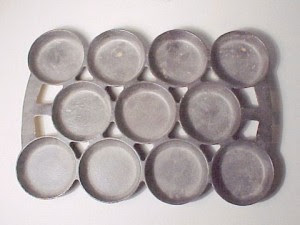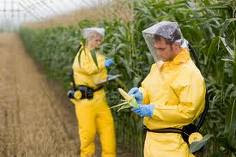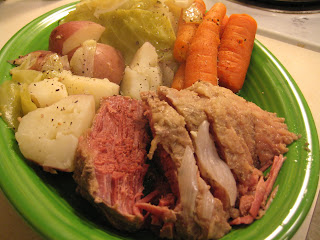
I have childhood memories of this pastry, of my Mother's effortless ability to make a light fluffy bread stuff with a hard golden brown shell. I remember them as a treat, a once in a year delicacy that we enjoyed unceremoniously and without warning, delivered to our breakfast table as if from some other world. Up until about the last ten months I have never attempted to recreate this culinary feat, judging, as I had, from the memory of their heavenliness that they would be entirely too complicated for a mere galley slave to recreate. Growing in confidence however, and wishing to share this airy delight with my wife I have endeavored to pursue this breakfast Shangrila.

Here are the sad results. Popovers with no POP.


What went wrong? I have no idea. I've tried to make them about half a dozen times now and have suffered these same results. I asked my Mom what I might've done wrong and she suggested that I probably forgot to add the baking powder. Baking Powder? What baking powder? The recipe doesn't call for baking powder. It's all right there in black and white, page 42 in the Betty Crocker cookbook:
2 eggs
1 cup all-purpose flour
1 cup milk
1/2 teaspoon salt
Being as Betty Crocker is the go-to book in our family for all things baking I was pretty sure that my Mom had been following that same recipe for all these years. When I told her that the recipe didn't call for any baking powder she just kind of scratched her head and laughed. "Well honey, I don't know, I guess it doesn't. Maybe you should try adding some."
I appreciated the advice but I was a little alarmed. I know that I've portrayed my Mom as a kind of conjuror of amazing comfort foods, but the truth is she isn't in touch with any kind of magical cooking ability at all. In my childhood minds eye I imagined her as a sort of witch standing over her cauldron, mixing together concoctions from the odds and ends of some netherkingdom. I have come to realize in my adulthood however that my Mother's cooking style is less like a freewheeling occultists and more like that of a research scientists. She is about the most obsessive recipe fanatic that I know. She doesn't just fling ingredients at a dish without having some peer reviewed document to back up her actions. Her expertise is in her attention to detail and the selection of equipment not the creativity she brings to it. So you can imagine my surprise at this sudden shift in her attitude. We don't just go around adding baking powder to failed recipes. For one thing that's not what Betty Croker says to do, for another thing it's not very scientific.
It's like when I was a kid I'd heard that flour was combustible. I wasn't privy to the conditions under which this was a danger but took the information to mean that if, say, I took flour, put it in a metal pipe and lit a fuse to it that it would blow up bigger than shit. As anyone knows who has tried this experiment at home flour pipe bombs are about as effective as smoking banana peels. I tried everything, I shoved a sparkler into the flour bomb, I tried firecrackers, I threw the whole thing in a fire and ran like hell. Nothing worked. I'd about given up hope when a neighbor kid told me that one of the key ingredients in gunpowder was sulfur. The year before I'd received my first chemistry set for a Christmas present and was fairly certain that sulfur was among the little white bottles in the case. I thought for sure that I'd cracked the code, that I would have my bomb and the elementary school up the hill would soon be destroyed. Yes, things were really beginning to come together. I took my flour bomb and mixed in a generous amount of sulfur, repacked it in the pipe and inserted a fuse. I carried it up to the school and set it next to the goal post on the soccer field for a test run. I lit the fuse and ran for cover. I was so sure that there would be a massive explosion that I'd worn extra clothing to protect from shrapnel and stuffed my ears with cotton so as not to blow out my eardrums.
You can imagine the results. And you can take this little anecdote as an object lesson on how the processes of baking are not effected by even the most creative of urges. At least in the observable Universe we are stuck with the recipe on page 42, unable to add or subtract for better results. Our failures are not inherent in the design of the recipe but in our own inability to accurately reproduce it. If my Popovers don't POP then by god it is not Betty's fault. The blame must be sought elsewhere. The ingredients might be old. Or the oven's thermostat might be faulty. Or perhaps the equipment I've been using is poorly designed for the project. Whatever the reason it should not lead me to doubt the science behind a hundred year old baking recipe. This shit is not witchcraft. It's science.
(I have to confess that at one point I thought that maybe my Mom's Popovers, and Betty's and my Grandmother's and all women I'd observed have success making these culinary conundrums had to do with some mysterious feminine quality. Like they were inherently more yeasty than men and therefor imparted more rise to their baked goods. This is a totally unscientific observation, but women are much more susceptible to yeast infections and that would lead one to believe that the two have some sort of natural connection. I'm sure this is just more of my flour + sulfur = explosives kind of calculus, but when your Popovers aren't popping you're prepared to believe just about anything.)
For a while I tried to put this Popover thing behind me. I'd run the gamut of problems and decided that the problem was me. I just wasn't cut out to make something that required such diligence and attention to detail. Then at Christmas time a miracle happened. My Mom, having stored this Popover frustration of mine in the cavernous region of her brain reserved for potential gift ideas, had thought to purchase me a genuine"Popover Pan" for a present. I knew that things like Popover pans existed but had always shied away from such products in favor of ordinary kitchen wares. I strive to be a low tech cook, but lately I've found my collection of odds and ends accumulating. I have a confession. I own a bunt pan. I also own a spring pan for making cheese cake, I have biscuit cutters, two biscuit pans, I have a zester, several contraptions to slice cheese, a melon baller, a dozen ramekins, a jello mold, all kinds of specialty equipment that verges on superfulous but for one possible utility. Some of it came from when my wife and I got married, but a lot of it came from the same woman who was now coming to the rescue with this Popover pan.
When will the madness end?
Should a man have to bow to these gadgets so that he can have what he wants, or is it unreasonable to ask oneself to go through life without enjoying a Popover now and then? In the science vs. nature debate I'm much more inclined toward nature. Nature seems less complicated and more comfortable to me. Besides that it doesn't shove math in your face at every turn. Of course technology has it's allures. Popovers are like the atom bomb of culinary achievements. You drop these little babies on your guests and you're sure to cement your place as a cooking superpower.
It's interesting to note that the invention of the Popover (and more generally the American quick-bread) coincides to the rise of the Second Industrial Revolution. English muffins and European breads are almost all leavened with yeast. What sets American quick-breads apart are that they are all chemically leavened, first in the late 1700's with pearlash, a refined form of potash that created carbon dioxide gas in the dough through an acid base reaction, and then in the 1850's with what we now know as baking powder, sodium bicarbonate. Both inventions allowed for the removal of unwanted fermentation flavors from some baking goods and cut down on the time required to prepare these products. Whereas European style leavened breads were formed into rising doughs these new inventions were of a wetter admixture and necessitated the use of special pans in which to contain the "batter". This is where we get the gem pan, or the cupcake pan. Incidentally the first reference to the source of my nickname, "cup cake" appeared in 1828 in a cookbook by Eliza Leslie. Before the mid-to-late 19th century these gem pans were not widely available. There were cast-iron varieties but their real proliferation began once the sheet metal press became more common place in industrial production. Before the gem pan people often used tea cups and/or clay ramekins for baking these quick-breads.
An early gem pan. This one looks to be some sort of casted piece, but you get the idea.

It wasn't until 1876 that the word Popover occurred in a cookbook by Mary Foote Henderson called "Practical cooking and dinner giving: A treatise containing practical instructions in cooking; in the combination and serving of dishes; and in the fashionable mode of entertaining at breakfast, lunch, and dinner" p. 71. I'd like to state for the record that there is no baking powder in Mary's recipe either, and confirms my suspicion that this particular concoction has remained unchanged for more than a century.
Mary like Betty offers the reader several options on what to cook their popovers in. In Mary's time, having formally introduced the recipe to the world, there wasn't the specialized equipment that is available in this age of the Popover pan and so could only offer roll and gem pans, or, as a last resort, tea cups. By press time in 1991 there were Popover pans aplenty on the market in the U.S. so Betty is all for using one. Well, alright then, lets give this damn thing a whirl. If this pan doesn't take my Popovers into outerspace then I don't think I'll ever deliver that atomic pay load.
Here are the results.

Damn you Oppenheimer. Another dud.
I've used the same ingredients, I've used the same equipment, even exceeded its rudimentary requirements, gone through the same procedures but still haven't been able to repeat the experiment.
I guess it's either back to the drawing board or it's time to put this chapter in my cooking history behind me.
Anybody want to buy a Popover Pan?
One last thing before I sign off. We've appealed to science for assistance and understanding, I think it's only fair to appeal to someone on the other end of the spectrum. Here is a recipe from King Arthur that claims to guarantee a never fail popover. On a Quest? Who better to turn to than King Arthur.
Why didn't I think of this sooner.





 Companies who engage in this patent process (Monsanto has over 11,000 separate seed patents) seek to make life itself their proprietary concern. This to me is the biggest absurdity, and the fact that our courts have allowed this to happen (Justice Clarence Thomas was once the head counsel for, you guessed it, Monsanto) should be reason enough to throw them out on their ears. No judge that deems this process a fair and reasonable standard of business should be sitting on our highest court, or any court for that matter.
Companies who engage in this patent process (Monsanto has over 11,000 separate seed patents) seek to make life itself their proprietary concern. This to me is the biggest absurdity, and the fact that our courts have allowed this to happen (Justice Clarence Thomas was once the head counsel for, you guessed it, Monsanto) should be reason enough to throw them out on their ears. No judge that deems this process a fair and reasonable standard of business should be sitting on our highest court, or any court for that matter.








 There's really not much else to it from there. Peel your onions, garlic, turnips and rutabaga. Chop everything according to size preferences. I like the rooty vegetables to be approximately the same size as the potatoes so that things cook evenly.
There's really not much else to it from there. Peel your onions, garlic, turnips and rutabaga. Chop everything according to size preferences. I like the rooty vegetables to be approximately the same size as the potatoes so that things cook evenly.






